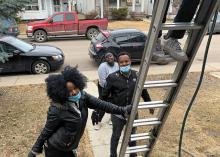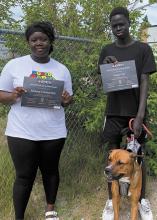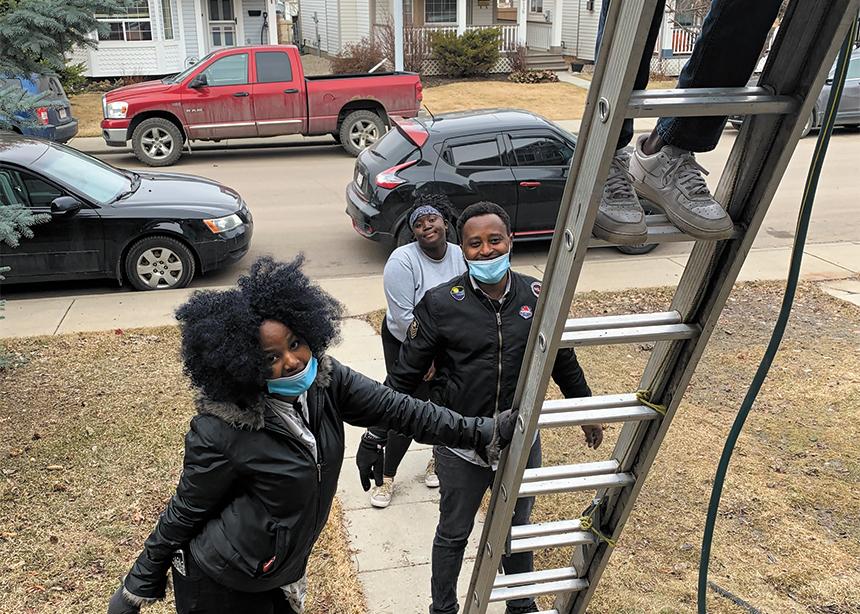Two Mennonite high school students from African countries were interviewed and accepted into the Civic Engagement by Newcomer Youth program last fall through the Edmonton Mennonite Centre for Newcomers. One of the requirements for the participants is to identify a problem or issue in the community they care about and come up with a plan to address that issue in some way.
Due to COVID-19, students were organized around their topic of interest before they began meeting online to make a plan. Helena Chokpelleh, a Liberian who attends Holyrood Mennonite Church, and Goanar Tut, who attends South Sudanese Mennonite Church, discovered they were both concerned about the effectiveness of online schooling and were especially worried about newcomer youths who were falling through the cracks.
They discussed the challenges: crowded apartments make it hard to find dedicated space; tablets need to be shared among family members; video cameras are usually turned off, decreasing accountability and increasing cheating; difficulty hearing the teacher on the device; and finally, weak Wi-Fi signals, making streaming unreliable, especially if the tenants in the apartment building are sharing the network.
“The only positive thing,” joked Chokpelleh, “is that your classroom is next to the fridge!”
Tut and Chokpelleh worked with four other students from South Sudan, the Democratic Republic of Congo, and Burundi. After determining that stronger Wi-Fi connections were needed by newcomer families, they then made a list prioritizing need based on how many years families had been in Canada, and how many school-aged children and youth were in each family.
Tut and Chokpelleh researched which boosters would make the most difference by going to Best Buy to talk to a specialist.
They tried identifying companies willing to donate or give a discount for Wi-Fi boosters, but hit a wall.
The group then decided to offer gutter cleaning in the community to raise money for the boosters. Tut had worked as a gutter cleaner the previous summer and he said he would look for clients. Unfortunately, they struggled to find clients. Even with delivering flyers on two occasions, and by word of mouth, they were only able to book two clients, which was enough to buy two boosters. They even tried to add other services, such as power raking and lawn mowing but still with no results.
Tut said, “It was hard, but we finished the project. I wondered if people didn’t think we were professional enough.”
Chokpelleh wondered if people were nervous due to COVID-19. Even though it wasn’t the result they hoped for, she still felt positive. “I really enjoyed hearing people’s ideas and trying to fix a problem,” she said.
In addition to completing a community project, participants were required to volunteer in the community monthly. Chokpelleh said that her favourite volunteer experience was at the Edmonton Food Bank because “I love getting to know new people.”
Tut enjoyed volunteering at the Edmonton Emergency Relief Services Society, where he rolled blankets and bed sheets for the homeless. “There’s always something to do in the community,” he said.
Other volunteer activities included teaching English to newcomer seniors online, cleaning up the city on Earth Day and working in community gardens.
Certificates were given in July to 24 refugee and immigrant youth who completed 120 hours of community engagement over nine months. The program’s goal was to empower newcomer youth to become leaders through civic engagement.
Do you have a story idea about Mennonites in Alberta? Send it to Joanne De Jong at ab@canadianmennonite.org.

Florence Irasubiza of the Democratic Republic of Congo, left, and Helena Chokpelleh, a Liberian who attends Holyrood Mennonite Church in Edmonton, clean gutters as a fundraiser to buy Wi-Fi boosters for low-income newcomer families. Community connector Emmanuel Mbonimpa is in front of the ladder. (Photo by Joanne De Jong)

Helena Chokpelleh of Holyrood Mennonite Church, left, and Goanar Tut of South Sudanese Mennonite Church, hold up the certificates they received in July 2021 after completing the Civic Engagement by Newcomer Youth program at the Edmonton Mennonite Centre for Newcomers. Tut’s dog is named “Scottie.” (Photo by Joanne De Jong)



Add new comment
Canadian Mennonite invites comments and encourages constructive discussion about our content. Actual full names (first and last) are required. Comments are moderated and may be edited. They will not appear online until approved and will be posted during business hours. Some comments may be reproduced in print.